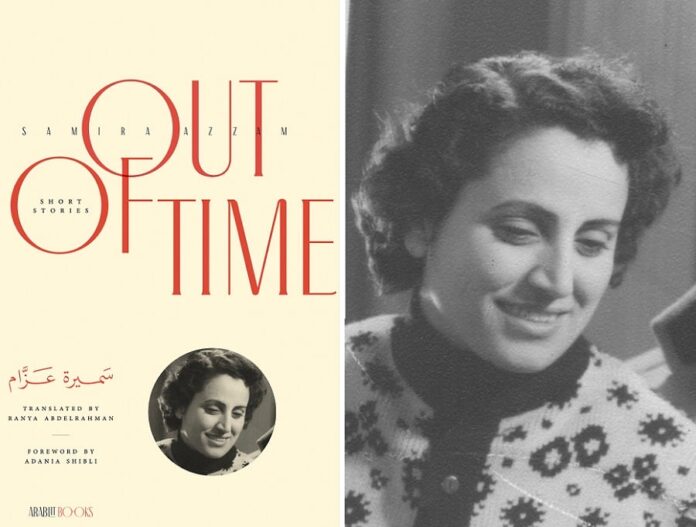DUBAI: Samira Azzam was one of Palestine’s greatest female authors of the 20th century. And yet she is relatively unknown today — her work in radio broadcasting, short-story writing and journalism largely forgotten.
Born in 1927 to a middle-class Christian family in the coastal city of Acre, Azzam became a school teacher when she was just 16 and contributed to the local newspaper while still a teenager (under the pseudonym ‘A Girl from the Coast’). Azzam, who taught herself English through a correspondence course, also translated the writings of George Bernard Shaw, John Steinbeck, W. Somerset Maugham, and Edith Wharton into Arabic.
A new book consists of 31 short stories by Azzam. (Supplied)
One reason why her name is not widely known today is due to her premature death at the age of 39 in 1967. Shortly before her 40th birthday, Azzam was on a summer road trip to Amman with friends to interview war refugees. She suffered a heart attack and died in the car.
During her short lifetime, four collections of her Arabic short stories were published. She did begin work on a novel, but ended up destroying it as the political situation in her homeland worsened.
“Azzam has not yet received the accolades she deserves,” the literary critic Faisal Darraj once claimed. But that situation may be changing with the arrival of “Out of Time,” a new book consisting of 31 short stories by Azzam, which have been translated into English by the Egyptian translator Ranya Abdelrahman. Published by ArabLit Books, the book was launched at the Emirates Literature Festival in Dubai in February.
Egyptian translator Ranya Abdelrahman. (Supplied)
“I felt it was a huge responsibility to be translating Samira Azzam’s work. I really wanted to do my best to bring her voice into English,” Abdelrahman tells Arab News. “I found her stories really strong and compelling. On the surface, they’re about ordinary things happening to ordinary people, but her characters are so vivid and alive. There’s often a twist that leaves you thinking. Her work really spoke to me. I was hooked.”
In the 1940s, during the Palestinian exodus, Azzam emigrated to Lebanon, where she became an active member of Beirut’s dynamic literary scene. Acclaimed by her contemporaries, Azzam’s work was featured in prominent magazines including “Al-Adab” at a time when print media was flourishing in the Arab world. She also recited her stories on the radio and travelled to Cyprus and Iraq as a journalist.
Azzam, Jabra Ibrahim Jabra and Ghassan Kanafani are widely considered to be the trifecta of modern Palestinian fiction writing. “There are three names there, and hers is the only woman’s name. That is telling,” says Abdelrahman, adding that Kanafani, who was assassinated in Beirut in 1972, referred to Azzam as his “teacher” and wrote a moving tribute to her after her death.
In the 70 or so short stories that she wrote, Azzam painted a picture of the rich and poor in Levantine society.
“She writes about a diverse array of subjects. She talks about loneliness, aging, grief, hypocrisy, and technology,” says Abdelrahman. “She has this vital sensitivity. She’s able to put herself so well into the shoes of other people of different ages and different walks of life. If you take all her stories together, it’s like a mosaic of the human experience.”
Short-story writing was popular in the 1950s for a number of reasons. “Short stories lent themselves very well to distribution. They could be read out loud on the radio. They could also be published in newspapers and as collections. They could easily reach the hands of readers,” explains Abdelrahman.
For the publishers of “Out of Time,” it was important to try and raise awareness of Azzam’s brilliance as an author. (Supplied)
But in the early 1960s, novel writing came to the fore, hailed by critics as the true test of an author’s creative abilities. In 1967, the year of the third Arab-Israeli war, Azzam was working on her ironically-titled novel “Sinai without Borders.” But only the first chapter was ever published. She destroyed the rest, possibly out of frustration and sadness at the violence in Palestine.
For the publishers of “Out of Time,” it was important to try and raise awareness of Azzam’s brilliance as an author.
“We hope that this is a small contribution towards bringing Samira’s work back, both to general readership and academic scholarship. Her stories are accessible but also profound. I would love to see them on an Arabic literature syllabus,” says Abdelrahman. “Our hope is that we’re bringing these stories out of a different time into our own time.”

